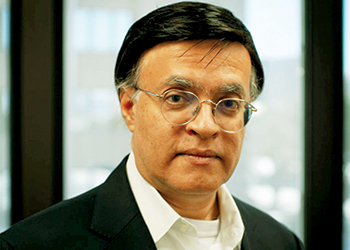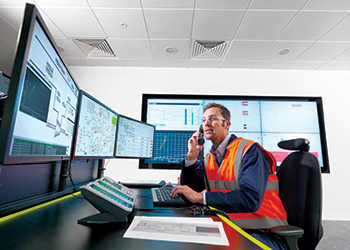
 Nair ... intelligent solutions
Nair ... intelligent solutions
From the advent of steam driven machines to mass production lines and automation, the world has gone through three industrial revolutions over the past three centuries. And it is now going through a fourth with digitalisation.
According to Dr Pratap Nair, President and CEO of Ingenero, the application of digitalisation technologies is increasing collaboration among global teams, augmenting the intelligence of users, converting large volumes of data into insightful information and enabling optimised just-in-time time decisions.
"Digital transformation is rapidly becoming the standard required for success," he says.
For process manufacturing applications, Ingenero, a world leading process analytics and technical consulting company, can deploy I-SSPDE, an applied AI-based solution.
The solution serves as an intelligent assistant to process manufacturing users, including operators, engineers, operating executives and management, by providing:
 |
I-SSPDE serves as an intelligent assistant to process manufacturing users |
• A clear view of current status of operations and how the operation stacks up against benchmarks (historical best, design, and theoretical optimal).
• Predictions of expectations going forward.
• Prescriptions on actions to be taken to prevent impending anomalies or adverse situations.
• Answers to what-if queries for specified scenarios, which are useful to troubleshoot, diagnose root causes, view operation responses to specified changes, and optimise operations.
• Augmented intelligence to the engineers, speeding up on the job training for new process engineers and also improving skills of experienced engineers, helping speed up the internal workforce upskilling.
Just as ChatGPT can be used to draft essays, in response to various prompts and used as a digital assist when drafting reports, I-SSPDE can be used to answer queries related to process manufacturing when making decisions.
I-SSPDE serves as an intelligent assistant that enables timely and higher quality decisions for improved production, efficiency, safety, emissions reduction, and Scope 1 carbon intensity.
The process of transforming data to actionable information that drives decision excellence requires technologies developed as part of the digital revolution. These include:
• Data platforms to handle, process and store data in a convenient way for easy use.
• Machine learning (ML) algorithms to convert data to relational models.
• Fundamental models to augment and provide scientific guidance for these models.
 |
Specialised applied AI engineering can help synthesise and configure multiple technology tools |
• Visualisation and interactive technology including BI dashboards (static or interactive), augmented reality (AR), virtual reality (VR), and interactive voice response to interface between the human user and the intelligent assistant.
• Workflow processes/software for implementation and automation tools (for example, robots, drones or advanced control system).
• Remote user connection (Internet of People (IoP)).
These technologies are integral pieces of an applied AI solution, and specialised applied AI engineering is needed to:
• Define the use case.
• Select the appropriate technology product from the plethora of technologies available in each of the technology categories aforementioned.
• Synthesise and configure these technology products to address the defined use case.
• Fill gaps, if any, with customised programming, when required.
• Use the appropriate algorithms to address the problem to be solved.
• Select the relevant data and features and its transformation, as required, to train the models (using auto features in platforms, where available, along with domain knowledge fine tuning), fill in the gaps with synthetic data generated by fundamental models, iterate and test extensively.
• Design and configure the interface with the user to deliver the user experience desired.
• Contextualise the output, develop the narrative around the computational outputs to facilitate understanding and implementation to ensure value capture.
• Provide initial AIOps support and user training on utilisation and AIOps handover.
Applied AI engineering is critical for successful solution deployment, but requires a specialised multidisciplinary team.
An outside vendor with significant experience will ensure speed of implementation and ability to navigate the hurdles that can stop the best of internal efforts.
Ingenero has this extensive applied AI engineering experience, and can use other independent vendors’ technology products or its own to deliver a solution on a build-operate-transfer (BOT) basis.
Applied AI solutions need the user’s trust and credibility to be effectively utilised to capture value.
Having the solution serve as an intelligent assistant for some time with the support of the applied AI engineering team is needed.
During this time, reliability issues, if any, can be ironed out and model results explained to build the confidence levels.
The implementation can then be automated by connecting directly to an advanced control system or other automation.
Ingenero has successfully deployed digital solutions at over 70 manufacturing sites in the past 8 years. These applications typically deliver millions of dollars in added value on average per use case.



















































































